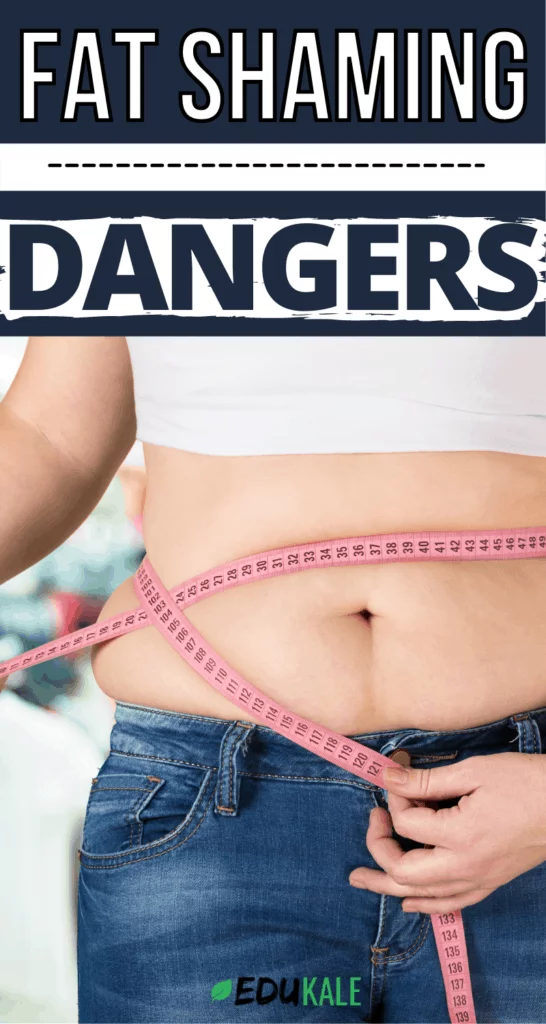This post contains affiliate links from which I may receive a small commission, at no extra cost to you. In no way does this affect my opinion or the information I provide on the product. Please read my disclaimer for more info.
“When I tell you that you need to lose weight, it’s only because I’m concerned for your health!”
How many times have overweight people heard this sentence?
While some may think that commenting on another person’s body may help motivate them to lose weight or become healthier, it’s actually the opposite. Not only does fat shaming fail at making people lose weight, but it can also have very harmful effects, and lead to even more weight gain.
Here’s what the science has to say on the dangers of fat shaming.

What is fat shaming?
Fat shaming involves criticizing people on their weight, excess fat, or eating habits, causing them to feel ashamed and embarrassed about their bodies.
People with extra fat are constantly associated with stereotypes such as not having self-control or willpower, being lazy, and being slothful. It is commonly believed that they deserve less respect because they are the only ones to blame for their bodies. They are stigmatized and discriminated against [1], and the people who fat shame do so all while hiding behind the supposedly commendable “health card”.
This is so embedded in our culture that having excess fat causes people to be misdiagnosed medically, or impacts the quality of care they receive [2]. Overweight and obese people also face discrimination in the workplace and have more trouble finding jobs [3].
But does fat shaming actually have a positive impact on people’s weights? Or can it be dangerous?

The dangers of fat shaming
Fat shaming leads to weight gain
Not only does fat shaming not lead to weight loss— it can actually cause weight gain. Studies [4,5] showed that rather than encouraging people to lose weight, weight discrimination actually promoted weight gain and obesity.
Weight stigma is a vicious cycle: the stress it brings on leads to more eating and more weight gain, which leads to more discrimitation, and the cycle goes on [6].
Another study [7] concluded that fat shaming was harmful to health and drove weight gain. Indeed, the exposure to weight bias triggered physiological and behavioral changes linked to poor metabolic health, which increased weight gain. The stress of weight stigmatization caused cortisol (the stress hormone) spikes, a drop in self-control, and an increase in the risk of binge-eating. Read this article if you want to know how to stop binge eating for good.
Multiple studies have shown that fat shaming and weight stigmatization leads to an increase in calorie consumption, which then leads to weight gain.
In this example [8], overweight and standard weight women were randomly assigned to watch a video that was either stigmatizing in regards to weight or neutral. After watching the video, they had snacks at their disposal that they were able to consume freely. Concerning overweight women, those who watched the fat shaming video ate more than 3 times as many calories as those who watched the neutral video.
For the women at a regular weight, the video they watched had little impact on their snack consumption. Overweight women who watched the neutral video consumed the fewest amount of calories, which wasn’t significantly different from either standard weight group. This highlights the ironic effects of fat shaming: it makes overweight women eat more thus gaining more weight, while having no impact on women of a standard weight, further increasing the weight divide.

A similar study [9] had overweight and regular weight women read magazines about either weight stigmatization or something entirely different. When presented with snacks, overweight women who had read the article on fat shaming ate more calories and felt less capable of controlling their eating. This was not the case for women of regular weight, and reading about weight stigma even increased their perceived dietary control.
Another reason why fat shaming leads to weight gain could be because of its impact on exercise. A study [10] showed that weight stigma could decrease physical activity levels. Weight stigma experiences were related to an increased desire to avoid exercise, which in turn led to less frequent and lower intensity exercise.
Fat shaming is harmful to mental health
Weight gain is not the only harmful effect of fat shaming: mental health is also negatively impacted.
A meta-analysis [11] of 105 studies looked at the negative consequences of weight stigma on different health outcomes. There was a strong association between fat shaming and mental health: higher weight stigma was significantly associated with worse mental health.
This association got stronger as the BMI of the individuals increased. This means that the heavier a person was, the more fat shaming impacted their mental health.
Other studies [12] show the same thing: weight discrimination is associated with substantial psychiatric morbidity. Fat shaming poses harmful consequences to overweight people’s psychological health.
It is also linked to depression, anxiety, low self-esteem, and eating disorders. There’s evidence that the severity of harm increases when people internalize the weight bias and turn it on themselves [7].

Weight stigma undeniably damages health, undermines human and social rights, and is downright unacceptable in modern societies [13].
How to break the fat shaming cycle
So now that we’ve established that fat shaming doesn’t work, here’s how to get out of it.
Stop automatically equating fatness to being unhealthy
First, it’s important to note that you cannot tell if a person is healthy or not by looking at their body. Obesity is associated with more health risks, yes. But some people are overweight and healthy, while others are thin and unhealthy.
Furthermore, if someone really cares about another person’s health, fat-shaming them will not work. It will only push them further down a negative spiral of being self-conscious, adopting toxic eating behaviors, and gaining weight. In addition, many perfectly healthy plus-size people who are far from obese are shamed constantly for their bodies— and it’s not for health reasons.
On the other hand, a lot of people just assume that thin-bodied people are healthy. In fact, many average-sized or thin people are extremely unhealthy. Yes, you can eat pretty healthily, be thin but smoke and drink daily. You can also eat way fewer calories than you need and have them all come from pizza and cake, and still be thin. But chances are, people are just going to assume that you are healthy, and aren’t going to comment on your weight.
What should you say to your overweight friend?
Nothing. The vast majority of overweight people know that they are overweight, and don’t need people reminding them about it. If they have very unhealthy eating habits and you are concerned for their health, it’s best to point that out instead of their weight.
What should you do if you are overweight?
If random people keep telling you that you should lose weight just because they just want you to be healthy, you have every right to tell them off. Now if they are close friends and family members telling you this in a gentle and non-fat shaming manner, and if you personally feel like you want to lose weight, here’s what you should do.
First of all, remember that you shouldn’t hate your current body or the body you’re going to have along the way. You need to accept that your healthy body might not look like the “ideal” body plastered all over the media. We all have different natural body types, ways to store fat, and a different set point. Check out my article on set point theory if you’re interested in learning more about that.

In order to sustainably lose weight, the best thing you can do for your body is to learn the basics of nutrition, make home-cooked meals with healthy and nutritious ingredients, eat mindfully and intuitively, and care for your body without punishing it with any drastic calorie reduction.
A good starting point for this is my healthy eating for beginners article. It covers all the basics on nutrition, healthy eating, and building a great relationship with food. You should teach yourself about these things and implement them little by little. Healthy and sustainable weight-loss takes time, and fat-shaming is NOT necessary to get there.
Here are two more articles I wrote that could also interest you:
Why you don’t really need to lose weight
Why you shouldn’t lose weight too fast
The dangers of fat shaming in conclusion
Fat shaming is not a beneficial tool for reducing obesity. Stigmatizing obese people threatens physical and mental health, generates health disparities and interferes with effective weight loss efforts [14].
Instead, it’s important to learn how to nourish your body properly for optimal health, to maintain a healthy relationship with food, to be physically active, and to take care of your mental health.
Thanks for reading!
-Lucie
If you’re interested in nutrition, its impact on our health, and the science behind it, you should definitely read How Not to Die. In this book, Doctor Michael Greger, founder of Nutrition Facts, examines the top causes of death in America and explains how your diet can prevent— and in some cases even reverse— them. His advice is all backed by science and he writes in a very clear and entertaining way. This book isn’t a list of what you already know. It will teach you the keys to living a long healthy life, in a simple and practical way, and without spending fortunes on supplements and pills!
PLUS if you want to take it a step further, you can check out the How Not to Die Cookbook to implement the advice easily!



Comments are closed.